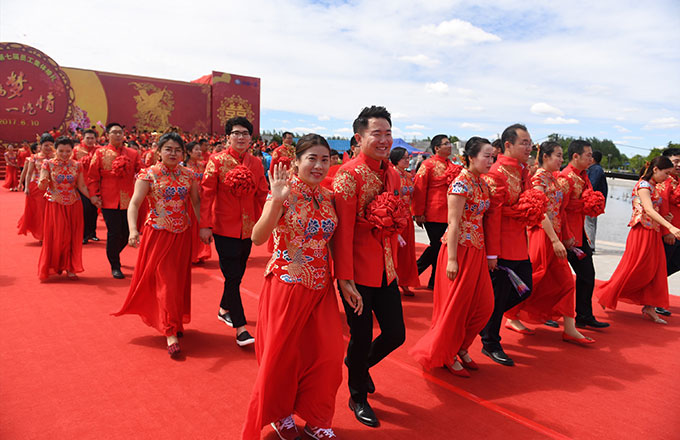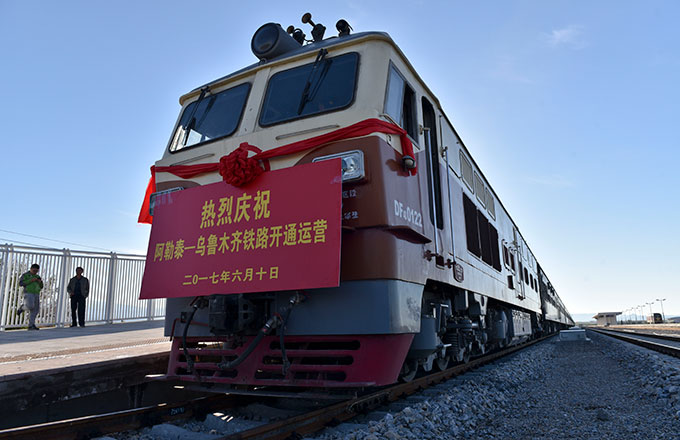May 4th Movement
The May 4th Movement which broke out in 1919 was a great anti-imperialist, anti-feudal revolutionary movement. It marked the beginning of the new-democratic revolution in China.
After the Beiyang (Northern) warlords replaced the rule of the Qing Dynasty, contradictions in Chinese society deepened.
Japanese imperialists seized the chance of World War I, when the European powers were too busy with wars among themselves to interfere in China, to quicken their pace in their attempt to occupy China. In late August of 1914, Japan declared war on Germany, and subsequently sent troops to Shandong, China, occupied the Jiaozhou-Jinan Railway in October and Qingdao in November, and seized all the special rights that Germany had possessed in Shandong Province. In May 1915, Japan compelled Yuan Shikai to recognize its "Twenty-one Demands," a secret document attempting to destroy China, by way of ultimatum. In 1917 Japan concluded an agreement with the United States, in which the United States consented to the special rights Japan enjoyed in China. From 1917 to 1918, Japan gained further control of Chinese railways, tax revenue, mines and forest resources, and rights of army training through huge loans. In 1918 it signed the "Military Agreement of Joint Defense Against Enemies" with the Duan Qirui government and sent troops, tens of thousands strong, to occupy China's northeast. During the world war period, the Japanese economic influence rapidly expanded in China. Between 1913 and 1919, the enterprises run by Japan in China increased from 36 to 178; banks, from 21 to 38 in China's northeast. The intensified aggression of Japanese imperialism aggravated the crisis of the Chinese nation. In September 1918, Zhang Zongxiang, then the Chinese Minister to Japan, went so far as to express "ready agreement," in an exchange of letters on the Shandong issue between China and Japan, to Japan's seizing of Germany's former special rights in Shandong. After coming to power, Duan Qirui continued selling out the country's sovereignty externally and carrying out autocratic rule internally in the name of the republic. In 1917, after warlord Zhang Xun engineered the restoration of Xuantong, the Manchu boy emperor, to the throne, Duan abrogated the 1912 Constitution of the Republic, organized a parliament under his control, unified the country by force and created a succession of civil wars, thus dragging China into an even darker abyss.
The May 4th Movement took place as a result of deepening contradictions between the Chinese people on the one hand and imperialism and feudal warlords on the other, and under the influence of the October Socialist Revolution in Russia and the subsequent upsurge of world revolution. Its direct fuse, however, was the failure of China in the Paris Peace Conference.
In November 1918 World War I, which had lasted for four years and three months, ended in the defeat of Germany, Austria, etc. In the following January, the victor countries held a peace conference at Paris for the purpose of drawing up a peace treaty with Germany. Participated in by more than 20 countries, the conference was actually manipulated by the United States, Britain and France. The U.S. president Woodrow Wilson, the British Prime Minister David Lloyd George and the French Premier Georges Clemenceau were the three policy makers. China sent a five-member delegation composed of Lu Zhengxiang, foreign minister of the Beijing government, Gu Weijun, minister to the United States, Shi Zhaoji, minister to Britain, Wei Chenzu, minister to Belgium, and Wang Zhengting, representative of south China's military government. Lu was the first delegate, but it was Wang and Gu who attended the conference regularly. Chinese delegates began by submitting an appeal to the conference of seven "hopeful conditions" and demanding the abrogation of the "Twenty-one Demands." The seven conditions were abolition of foreign spheres of influence; withdrawal of foreign troops and policemen stationed in China; dismantling foreign post, wire and wireless telegram offices; annulment of consular jurisdiction; return of leased territory; removal of foreign concessions; and restoration of Chinese authority over the Customs administration. The conference's manipulators refused to discuss China's demands on the excuse of their being "beyond the scope of the peace conference." Then the Chinese delegation brought up the Shandong issue and asked for the return of the former German leased territories in Jiaozhou Bay, the Jiaozhou-Jinan Railway and other privileges directly to China. Despite Gu Weijun and Wang Zhengting's strong protests, China's demands were again turned down, due to the pressure of international power politics. On April 30 the articles about the Shandong issue in the Paris Peace Treaty were decided by Britain, the United States and France in a meeting to which the Japanese delegates were invited and the Chinese delegates were not allowed to attend. It was laid down in the treaty that all the former German interests in Shandong were to be taken over by Japan. On May 1, the British foreign minister notified the Chinese delegation of this decision.
When World War I came to an end, the Chinese people, having long suffered from imperialist aggression and full of hopes for national independence, had hailed "the victory of truth over might" and the "14 Articles of Peace" put forward by the U.S. president Wilson. But the method of dealing with the Shandong issue at the Paris Peace Conference rid the Chinese people of their illusion and made them realize the need for themselves to "take direct action." The May 4th Movement thus broke out.
Before May 4, activities for national sovereignty had been launched among people from all parts of society. The natives of Shandong in Beijing organized a diplomatic support society. More than 100,000 people held a petition rally in Jinan expressing their determination to "fight to the death" for the restoration of Shandong sovereignty. Over 10,000 college students in Beijing published an open telegram to the nation and the Chinese delegates to the Paris Peace Conference demanding "abolish the Chinese-Japanese secret treaty" and "safeguard national rights." Personages from political circles like Xiong Xiling, Lin Changmin and Wang Daxie set up a Chinese People's Diplomatic Association in Beijing, and published open telegrams on several occasions for restoring national sovereignty. Students', workers' and merchants' organizations in Shanghai and hundreds of parliament members in Guangzhou also sent open telegrams to voice their appeal.
- China issues guidelines to develop 'all-for-one' tourism demonstration zones
- Torrential rain triggers disaster in Southwest China
- Harvest time for wheat reapers in Shanxi
- Over 200 couples marry in Changchun group wedding
- Calligraphy tops other icons of Chinese culture, WeChat data shows





















